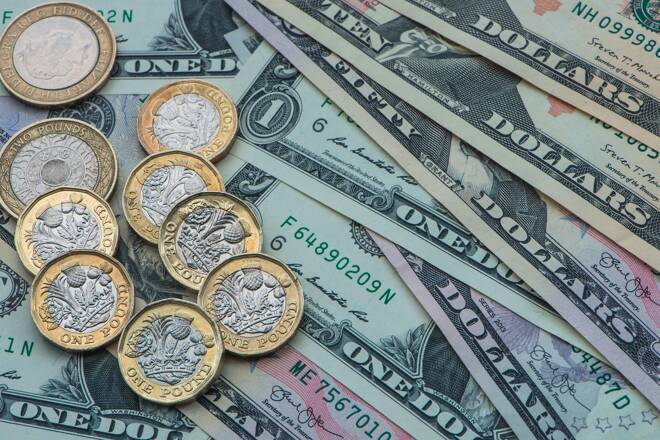Advertisement
Advertisement
GBP to USD Forecast: Sterling’s Struggle amid UK Economic Woes
By:
With the British Pound under pressure, today’s focus turns to UK retail sales and PMI numbers, forecasting further economic setbacks in the UK.
Highlights
- GBP/USD saw a 0.40% dip on Thursday; UK economic outlook remains gloomy.
- UK retail sales could forecast a prolonged economic slump.
- GBP/USD trend hinges on the forthcoming UK and US services PMI numbers.
Overview of the Thursday Session
On Thursday, the GBP to USD pair fell by 0.40%. After a 0.39% loss on Wednesday, the GBP/USD ended the day at $1.22941. The GBP/USD pair rose to a high of $1.23462 before sliding to a Thursday low of $1.22369.
UK Retail Sales and Services PMI to Give an Economic Snapshot
UK retail sales will be in focus this morning. The UK macroeconomic environment has deteriorated rapidly, forcing the Bank of England (BoE) to leave monetary policy unchanged on Thursday.
Retail sales figures could increase market expectations of a prolonged UK economic recession. Economists forecast UK retail sales to rise by 0.5% in August versus a 1.2% decline in July.
With UK consumption accounting for over 60% of GDP, another fall in retail sales would support the gloomy economic outlook.
Later today, UK private-sector PMI numbers for September also need consideration. The services sector PMI will influence the GBP/USD pair more. Accounting for 70% of the UK economy, a deeper contraction across the services sector would keep BoE interest rate hikes off the table.
Economists predict the UK services PMI to fall from 49.5 to 49.2 in September.
A deteriorating macroeconomic environment may bring forward the timing of the first BoE interest rate cut. Lower interest rates would support labor market conditions and wage growth. Lower borrowing costs would yield a pickup in disposable income and fuel private consumption.
US Services Sector in the Spotlight
US services sector activity will also be in focus today. The US services sector contributes 80% to GDP. A pickup in service sector activity would further drive investor bets on a November rate hike. Significantly, a hotter US macroeconomic environment would also reduce the chance of a 2024 Fed interest rate cut.
Economists forecast the US Services PMI to increase from 50.5 to 50.6 in September.
A pickup in service sector activity would fuel inflationary pressures. Higher interest rates would curb consumption, easing demand-driven inflationary pressures.
Short-Term Forecast
Economic and monetary policy divergence remains tilted toward the US dollar. The near-term trajectory for the GBP/USD will hinge on the services PMI numbers. A slump in UK retail sales and a more marked contraction across the UK services sector would leave the GBP/USD on its current descending trajectory.
GBP to USD Price Action
Daily Chart
The GBP/USD pair remained below the 50-day and 200-day EMAs, sending bearish price signals. A return to $1.23 would support a GBP/USD move toward the $1.24410 resistance level. However, UK retail sales and services sector PMIs must beat forecasts to target $1.24.
Weaker-than-expected economic indicators would support a GBP/USD break below the $1.22150 support level.
The 14-period daily RSI reading of 25.46 shows the GBP/USD pair in oversold territory.
4-Hourly Chart
The GBP/USD sits below the 50-day and 200-day EMAs, reaffirming bearish price near-term signals. A GBP/USD return to $1.23 would support a move to the 50-day EMA.
However, failure to break out from $1.23 would leave the $1.22150 support level in play.
With a 33.74 reading on the 14-period 4-hourly RSI, the GBP/USD pair can fall to $1.2250 before entering oversold territory.
About the Author
Bob Masonauthor
With over 28 years of experience in the financial industry, Bob has worked with various global rating agencies and multinational banks. Currently he is covering currencies, commodities, alternative asset classes and global equities, focusing mostly on European and Asian markets.
Advertisement
